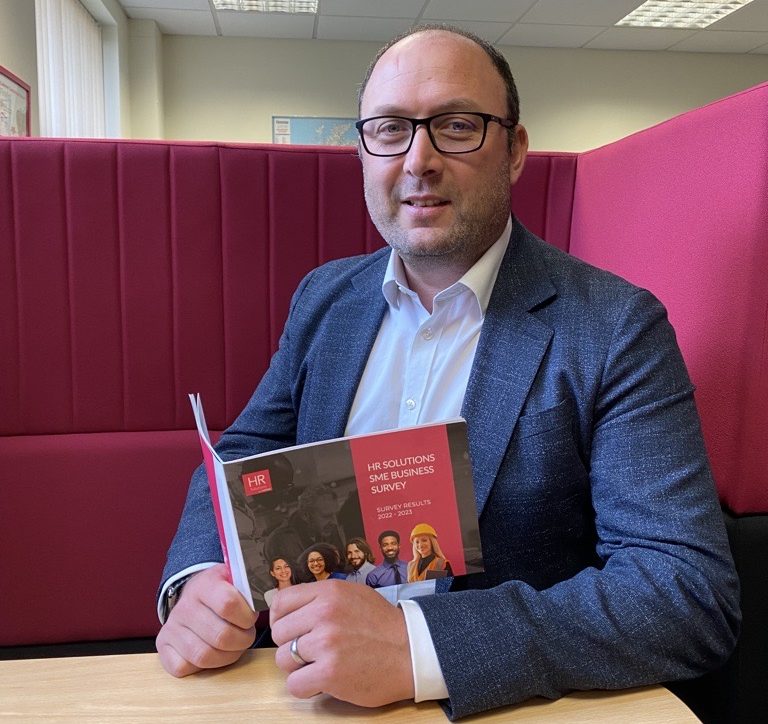Council loan could trigger regeneration of area surrounding Derby railway station
Construction firm appointed for new Chesterfield mental health hub
East Midlands business confidence grows
More than half of SMEs predict rising costs will be key challenge in 2023
90 jobs on the line at JD Sports brands acquired by Frasers Group
Grimsby Town slip to £930,000 loss despite turnover rise
East Midlands’ Information and Communications sector forecast to be UK’s fastest growing sector in 2024-26
| Region | 2023 GVA Growth | Region | Annualised GVA Growth 2024-26 |
| London | -0.2% | London | 2.6% |
| Scotland | -0.6% | South East | 2.2% |
| UK | -0.6% | UK | 2.1% |
| East | -0.7% | South West | 2.1% |
| Northern Ireland | -0.7% | East | 2.1% |
| South East | -0.7% | West Midlands | 2.1% |
| North West | -0.7% | North West | 2.0% |
| Wales | -0.8% | Northern Ireland | 1.9% |
| South West | -0.8% | East Midlands | 1.9% |
| North East | -0.8% | Wales | 1.7% |
| West Midlands | -0.8% | Yorkshire & the Humber | 1.7% |
| Yorkshire & the Humber | -1.0% | North East | 1.7% |
| East Midlands | -1.0% | Scotland | 1.7% |
EMEC welcomes ex-army captain as new project manager
Leicestershire businesses focus on skills, costs, and exports as region moves on from lockdown
Small businesses in Leicester and Leicestershire continue to keep a close eye on skills, costs, and exports as the region moved past lockdown and addressed new challenges.
Results from the latest Leicester and Leicestershire Enterprise Partnership (LLEP) Business Tracker Survey, conducted in December 2022, have now been published.
They show the responses from local SMEs to the latest of four surveys, each of which has checked the pulse of businesses over the last two years.
The purpose of the project throughout has been to better understand, and respond to, the needs of local businesses as a consequence of the pandemic.
The first survey was conducted in December 2020 and provided officers with data around how business was managing the impact of Covid-19.
Data has provided an insight into local business confidence, where support has been required, been used as evidence for funding bids, and shown how businesses have adapted.
The sequence started two years ago and 118 businesses participated in the fourth and final survey.
Tracker survey data has been used to support successful bids for the £3m Made Smarter programme, which is supporting digitalisation of East Midlands manufacturing businesses, and the £1.3m Create Growth programme, which is helping East Midlands creative businesses to grow.
Headlines from the final survey include:
-
Only 30% of organisations were satisfied with their workforce’s basic skills. This is the lowest level recorded and fits with anecdotal evidence from local businesses that new starters may have missed out on learning ‘soft skills’ in a physical working environment.
-
There remain many skills challenges to address. The LLEP is now working to improve alignment between skills required by businesses and how schools and further education support students to meet these challenges.
-
Recruitment difficulties also remain. Businesses are responding with salary rises and increased training. In total, 38% of businesses had experienced difficulties with recruitment during the last six months. More than two-fifths of businesses have capacity to offer work experience.
-
Europe continues to be the key trading partner for both imports and exports. More than 50% of those involved in exporting were experiencing challenges, which most blamed on the UK’s exit from the EU. Import challenges were blamed both on Brexit and shipping issues.
-
Around 8% of businesses are struggling to repay Government support accessed during the pandemic. This is likely to become a more serious issue once increased costs associated with cost of living and energy prices are factored in.
-
About 57% of businesses have been significantly impacted by inflation of raw material costs. Shipping costs and utility prices also factored, with most businesses raising their own prices, as well as looking for cost and supply chain savings.
Andy Reed OBE, co-chair of the LLEP Board, said: “The survey has covered themes that directly impact local businesses of all sizes, from skills and recruitment to digital investment and exporting patterns.
“What it has shown us is that the situation remains delicate for many small businesses in the region.
“This time a year ago, 90% were cautiously optimistic about the future, but that has since slid to just over eight in ten as the impact of inflation began to bite.
“We will continue to use the data from all four tracker surveys to inform programmes and policy at the LLEP as we move forward.”
The survey went to businesses ranging from two to 249 employees. About a quarter were based in the city, with the remainder operating across Leicestershire.
Businesses covered a range of sectors, from agriculture and construction through to logistics, education, hospitality and the arts.












